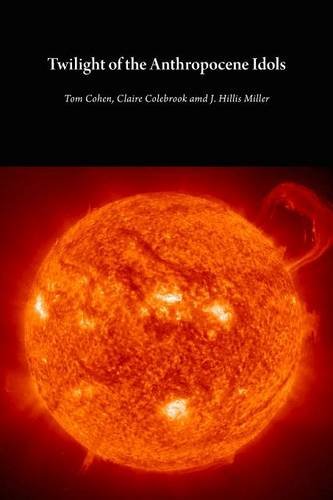October, 155: A Questionnaire on Materialisms (2016)
Filed under survey | Tags: · actor-network theory, anthropocene, art, human, materialism, networks, object-oriented ontology, philosophy, speculative realism, subject, subjectivity, thing
“Recent philosophical tendencies of “Actor-Network Theory,” “Thing Theory,” “Object-Oriented Ontology,” “Speculative Realism,”and “Vibrant Materialism,” have profoundly challenged the centrality of subjectivity in the humanities and, arguably, the perspectives that theories of the subject from the psychoanalytic to the Foucauldian have afforded (on the operations of power, the production of difference, and the constitution of the social, for instance). At least four moves characterize these discourses:
• Attempting to think the reality of objects beyond human meanings and uses. This other reality is often rooted in “thingness” or an animate materiality.
• Asserting that humans and objects form networks or assemblages across which agency and even consciousness are distributed.
• Shifting from epistemology, in all of its relation to critique, to ontology, where the being of things is valued alongside that of persons.
• Situating modernity in geological time with the concept of the “Anthropocene,” an era defined by the destructive ecological effects of human industry.
Many artists and curators, particularly in the UK, Germany, and the United States, appear deeply influenced by this shift. Is it possible, or desirable, to decenter the human in discourse on art in particular? What is gained in the attempt, and what—or who—disappears from view? Is human difference—gender, race, power of all kinds—elided? What are the risks in assigning agency to objects; does it absolve us of responsibility, or offer a new platform for politics?” (from the introduction)
Responses by Emily Apter, Ed Atkins, Armen Avanessian, Bill Brown, Giuliana Bruno, Julia Bryan-Wilson, D. Graham Burnett, Mel Y. Chen, Andrew Cole, Christoph Cox, Suhail Malik, T. J. Demos, Jeff Dolven, David T. Doris, Helmut Draxler, Patricia Falguières, Peter Galison, Alexander R. Galloway, Rachel Haidu, Graham Harman, Camille Henrot, Brooke Holmes, Tim Ingold, Caroline A. Jones, Alex Kitnick, Sam Lewitt, Helen Molesworth, Alexander Nemerov, Michael Newman, Spyros Papapetros, Susanne Pfeffer, Gregor Quack, Charles Ray, Matthew Ritchie, André Rottmann, Amie Siegel, Kerstin Stakemeier, Artie Vierkant, McKenzie Wark, Eyal Weizman, Christopher S. Wood, and Zhang Ga.
Edited by David Joselit, Carrie Lambert-Beatty, and Hal Foster
Publisher MIT Press, Winter 2016
ISSN 0162-2870
108 pages
PDF (updated on 2017-11-24)
Comment (0)Tom Cohen, Claire Colebrook, J. Hillis Miller: Twilight of the Anthropocene Idols (2016)
Filed under book | Tags: · anthropocene, climate crisis, ecocriticism, environment, human, literature, theory

“Following on from Theory and the Disappearing Future, Cohen, Colebrook and Miller turn their attention to the eco-critical and environmental humanities’ newest and most fashionable of concepts, the Anthropocene. The question that has escaped focus, as “tipping points” are acknowledged as passed, is how language, mnemo-technologies, and the epistemology of tropes appear to guide the accelerating ecocide, and how that implies a mutation within reading itself—from the era of extinction events.
Only in this moment of seeming finality, the authors argue, does there arise an opportunity to be done with mourning and begin reading. Drawing freely on Paul de Man’s theory of reading, anthropomorphism and the sublime, Twilight of the Anthropocene Idols argues for a mode of critical activism liberated from all-too-human joys and anxieties regarding the future. It was quite a few decades ago (1983) that Jurgen Habermas declared that ‘master thinkers had fallen on hard times.’ His pronouncement of hard times was premature. For master thinkers it is the best of times. Not only is the world, supposedly, falling into a complete absence of care, thought and frugality, a few hyper-masters have emerged to tell us that these hard times should be the best of times. It is precisely because we face the end that we should embrace our power to geo-engineer, stage the revolution, return to profound thinking, reinvent the subject, and recognize ourselves fully as one global humanity. Enter anthropos.”
Publisher Open Humanities Press, 2016
Critical Climate Change series
Creative Commons BY-SA 4.0 License
ISBN 9781785420153 (Print), 9781785420160 (PDF)
220 pages
PDF, PDF, PDF (3 MB, updated on 2016-7-19)
Comment (0)Donna Haraway: How Like a Leaf: An Interview with Thyrza Nichols Goodeve (1999)
Filed under book | Tags: · animal, biology, body, capitalism, critical theory, cyborg, feminism, genetics, history of science, human, interview, metaphor, nature, politics, race, science, semiotics, technoscience, women

A lengthy interview-conversation that covers aspects of both Haraway’s life and work.
Publisher Routledge, 1999
ISBN 0415924022, 9780415924023
197 pages
Reviews: Tony Scott (Kairos, 2000), Erika Bourguignon (NWSA Journal, 2001).
Commentary: McKenzie Wark (Public Seminar, 2015).
PDF (2 MB, updated on 2018-5-11)
Comment (0)
